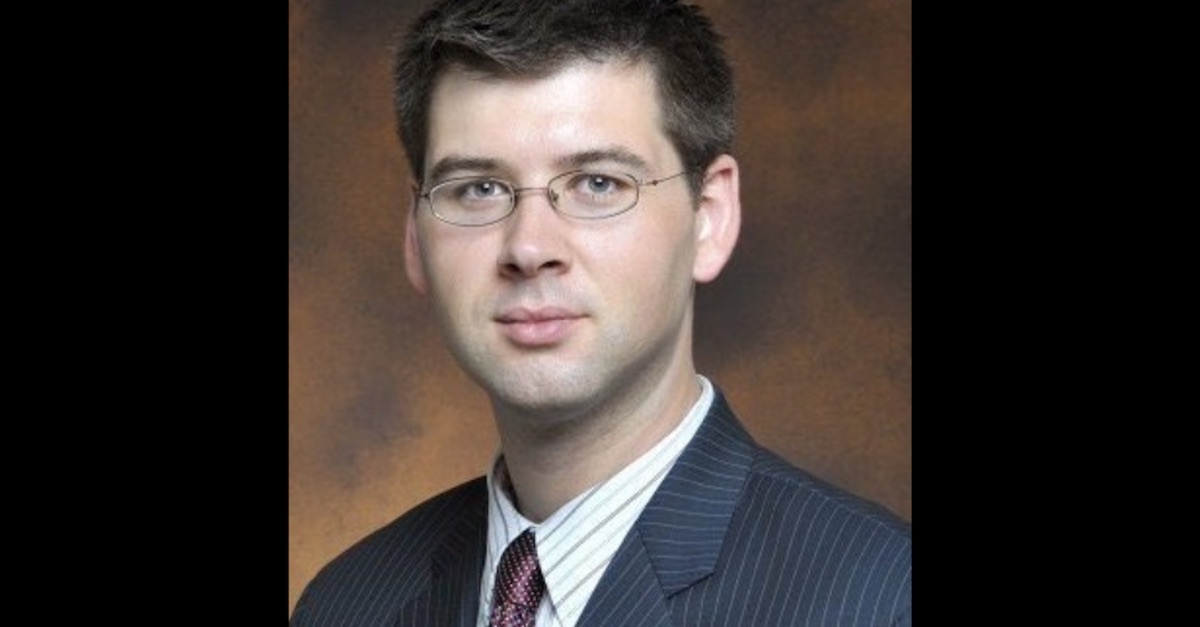
Kevin Clinesmith, the former FBI lawyer who admitted that he altered an email which was used in a Foreign Intelligence Surveillance Act (FISA) warrant application to surveil then-Trump Campaign Foreign Policy Advisor Carter Page, has been sentenced to twelve months of probation and ordered to pay a $100 special assessment. That’s according to federal court records reviewed by Law&Crime.
Clinesmith admitted guilt shortly after he was charged in Aug. 2020 with one count of knowingly making and using a false writing and document.
Clinesmith’s added words indicated that Page was “not a source” for the Central Intelligence Agency. His defense said he made the alteration so he didn’t have to go through the step of gathering additional communications from the CIA, Politico explained. Clinesmith also claimed that he thought at the time that the words were true. It turned out that they were not. An inspector general’s report said that a CIA liaison told an attorney — believed to be Clinesmith — that Page “did, in fact, have a prior relationship with that other agency.”
Judge James E. Boasberg previously ordered that Page would receive no restitution. Boasberg also downplayed the ultimate effect Clinesmith’s alteration had on the FISA court’s decision to issue warrants to wiretap Page.
Boasberg, who sits on the court which handles FISA applications in addition to his role as a federal judge, has been appointed various benches by both George W. Bush and Barack Obama.
Court records indicate that Page was allowed to speak at the sentencing hearing for up to 10 minutes as a witness. Both Clinesmith and the government contested to Page’s attempt to claim he was a victim in the case, leading to a harsh rebuke in a court filing by Page on Jan. 12:
When a law enforcement official lies to obtain a warrant without probable cause, whether the target of the warrant is a victim of that crime is not a difficult question. Based on longstanding law, the answer is yes. Nonetheless, for reasons divorced from that established law, both defendant Kevin Clinesmith and the Government contest that Carter Page (“Dr. Page”) is a victim of the offense in this case under the Crime Victims’ Rights Act (“CVRA”), 18 U.S.C. § 3771.
It is not surprising that Clinesmith denies that Dr. Page is a victim of the offense. After all, he has done his best to deny any real responsibility for his criminal act, as well as the consequences of it. He attempts to transform the facts of this case to portray himself as the only real “victim” before the Court. Further, although a lawyer and a law enforcement official, he claims to be the victim of his supposedly good faith alteration of a document—critical to whether a secret warrant to surveil an American citizen would be issued—to make it “more accurate.” This absurd reconstruction of the facts was comprehensively demolished by the Government’s Sentencing Memorandum.
It is quite surprising the Government also contests that Dr. Page qualifies as a victim of Clinesmith’s crime pursuant to the CVRA. Of course, the Government’s pecuniary interests are now exposed because it is being sued by Dr. Page based on the unlawful acts of Clinesmith and his colleagues. The notion that Dr. Page is not a victim in this matter is so jarring and untenable that the Government attempts to ameliorate it by agreeing that Dr. Page should be allowed to speak at sentencing. But federal courts are not in the habit of permitting persons other than victims to speak at criminal sentencings. The “compromise” tendered by the Government implicitly acknowledges that Dr. Page is a victim of Clinesmith’s offense. The Government will not openly admit this obvious conclusion, evidently because of its own financial exposure to Dr. Page’s pending suit for damages.
At the hearing, Page did not agree with the government’s request for a six-month jail sentence. Rather, he told the judge that he hoped Clinesmith was able to “get back to his family as soon as” possible. Durham had asked the judge to “send a message” by sentencing Clinesmith to prison despite the fact that the defendant’s wife is pregnant. Page spent the bulk of his time telling the court how his own life has been turned upside-down after being surveilled by the government. He said he had been “harassed” in public and had also received death threats.
Clinesmith’s case is thus far the only fruit borne by an investigation headed by John Durham, the U.S. Attorney for the District of Connecticut. The so-called “Durham Probe” was designed to examine the origins of the investigation into U.S. election interference by Russian operatives which for years was headed by Special Counsel Robert Mueller. Former President Donald Trump continuously railed that the Mueller investigation was little more than a dirty smear campaign orchestrated by Democrats who were intent on keeping him out of office. Mueller’s probe netted the convictions of many of Trump’s own campaign staffers, including Paul Manafort, Roger Stone, Michael Flynn, and George Papadopoulos; however, Trump pardoned them all. Durham’s ‘investigation into the investigation’ has netted only Clinesmith — thus far — and Judge Boasberg seemed to view Clinesmith’s behavior as lazy and unethical legal work more than as a symptom of a corrupt federal government that was hell-bent to take out Trump.
Boasberg noted that Clinesmith will likely face professional conduct sanctions by the bar — including possible disbarment. Clinesmith admitted that his crime will forever alter his life.
Former Attorney General William Barr appointed Durham as special counsel in order to preserve the probe after the Trump presidency and his own time as Attorney General came to an end.
Late last year, Clinesmith’s sentencing was pushed back until after President Joe Biden was inaugurated into office.
Carter Page is suing the government over his treatment in the underlying FISA warrant matter.
[image via Clinesmith for Columbia Heights AND campaign]